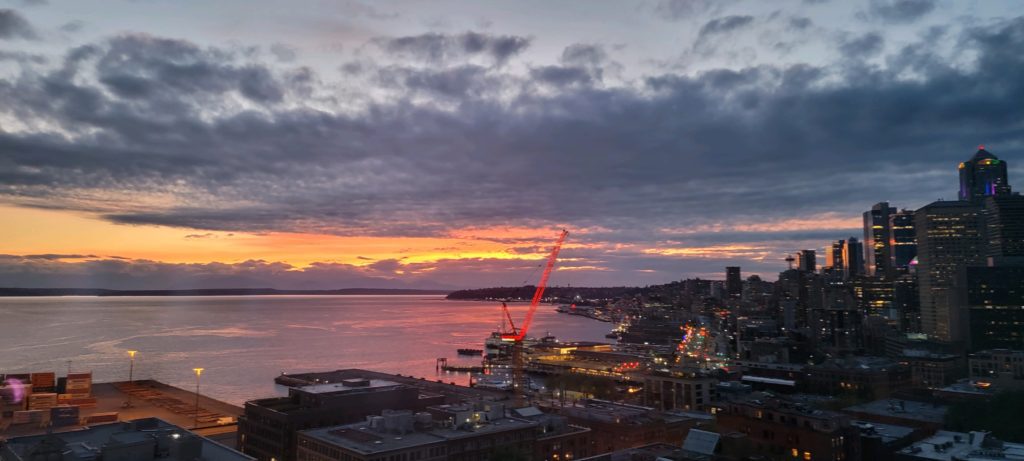Thirty years ago, I was on the cusp of moving to Seattle.
I was transferring to Seattle University with one Pearl Jam album and no other knowledge whatsoever.
Then Singles came out. It was Seattle Cliff Notes:
- Dudes in bands
- Cool brick Capitol Hill apartment buildings
- Well-intentioned, mass-transit-loving traffic engineers
- Cafes
- Hills
I didn’t know that most of my adult life would be here, or that I’d move here three times. I’ve been friends with dudes in bands and with engineers (and musician-engineers). Tom Skerritt was at my college graduation. I have lived in cool brick Capitol Hill apartments. So many cafes. So many hills! I’ve also snuck into the Soundgarden, dumpster-dived, mosh-pitted, and drank many election night beers. I’ve written good speeches, solid op-eds, mediocre fiction and horrific poetry. I watched a band of hippie, lefty Washington Citizen Action canvassers turn into responsible citizens.
It turns out Seattle is fertile ground for people who are idealistic and persuasive.[i] But I didn’t know any of that in 1992. I just liked the look of the place.

It makes me wonder, what are we on the cusp of now?
The COVID pandemic gave us more than two years of uncertainty and terror. No mystery what comes next: years of uncertainty and change. “But a time of great uncertainty is also an opportunity to rethink what business leaders have assumed to be true.”[ii]
What stays the same in a post-pandemic, New Normal Seattle? What changes? And how do we ditch old assumptions so we can better manage faster change?
Although updated by now, the Air Force used to train pilots to use an OODA loop: Observe, Orient, Decide and Act. Observe and gather relevant data, orient yourself to the context, make the decision, act on it, and immediately begin gathering new data. The faster you move from one stage to another— gathering information, reorienting, deciding and acting— the better pilot you are.[iii]
So here’s a couple quick takeaways from the Sunshine Communications OODA loop, starting with observations and orientations:
- People are changing jobs all over the place
- Large and small in-person events are coming back
- Organizations are taking on more complex problems now that we can meet in person
- Subject matter experts in government, healthcare and environmental sciences are good at knowing and bad at telling
- Communication problems and business problems are interrelated[iv]
- Agency and business budgets are uncertain, especially in the long run
The evolving environment triggers new decisions and actions at Sunshine Comms:
- Shiny new website: The incredible Jamie Douglas built a warm, welcoming and dynamic website that better reflects the work: mkcrsunshine.com.
- New training approach: We need more experts to be effective communicators,[v] so I standardized some basic trainings with segments that can be recorded and delivered asynchronously. This will help more people within a single organization get the same training, without the barrier of trying to schedule a group. Customization and individual coaching are still there because feedback is what makes us better.
- Broader view for deeper value: Communication crises are too often symptoms of organizational failures. Let’s work on holistic solutions that address operational failures, so we can reduce the chance of future self-inflicted wounds.
Then there are things that don’t change:
- The only thing worse than trying to solve problems with other people is trying to solve them alone. I’m so lucky to have so many expert partners in video, ad sales, podcasting and graphic and web design. LundFaucett and Hubbell Communications are the real strategic muscle of 2022, and I would not be having so much fun without them.
- Seattle is a great city. Even on the worst days, someone’s making art or starting a business or writing a book. Hell—they’re creating especially on the worst days. This is a city of innovative problem-solvers, and they’re working in both the for-profit and nonprofit world. Let’s recognize and support them.
- Seattle’s full of people with compasses aimed in the right direction. I asked Dan Kully if he could help a friend-of-a-friend of mine. “Of course!” Dan said, enthusiastic as ever. “We’re in the helping business, aren’t we?” Damn straight.
- Like Singles’ Cameron Scott and Kyra Sedgwick, we’re going to keep working on mass transit, restoring watersheds, eliminating waste, and taking care of our neighbors. We are idealistic AF.
Party on, people.[vi] We’ve got a world to fix.[vii]
[i]In the movie, the boy who wants to build trains for WSDOT falls for the girl who works for an environmental nonprofit. Actual movie lines: “The Times wants to know why there’s gridlock on the I-5 corridor!” and “They will park and ride, I know they will!” His train idea? Shot down by Viper. Cameron Crowe is a god.
[ii]Act Like A Scientist:Great leaders challenge assumptions, run experiments and follow the evidence. Great article. HBR
[iii]My apologies to all members of the armed forces for my dumbed-down version of a highly technical process!
[iv]Actually that’s not new. It’s just increasingly obvious.
[v]Or at least, not awful.
[vi]We can’t fix the world without music. I refreshed the Sunshine Communications playlist—washed out the winter doldrums and added some more sun-themed and summer-inspired songs (and the whole Singles soundtrack). Do not miss the incomparable Joy Oladokun’s look up.
[vii]This is supposed to be a marketing email. If you or someone you love is having trouble communicating to stakeholders or the public, please call me. If I can’t help you, I am happy to find someone who can. I’m in the helping business. (206) 817-4845.
PHOTO: Many thanks to Matt Ellsworth for the beautiful solstice sunset photo.



